Igualdad y comunidad en el modelo de campamento de G. A. Cohen: un compromiso con el igualitarismo fraternal
Resumen
A partir de las críticas que el igualitarismo fraternal lanzó contra el igualitarismo de la suerte, G. A. Cohen propuso un compromiso a través del denominado modelo de campamento. Puesto que dicho trade-off no quedó formalizado, en este artículo se intenta aportar algunos elementos en tal dirección. En concreto, se argumenta: a) que Cohen tiende un primer puente hacia el igualitarismo fraternal al distinguir los aspectos de equidad y legitimidad en una concepción de lo justo, conjuntamente con la afirmación de que la suerte en las opciones nunca preserva la justicia; b) que los principios igualitario y comunitario, que Cohen postula como deseables para el socialismo, operan sobre la base de la distinción equidad-legitimidad, de modo que las desigualdades generadas por elecciones genuinas y mala suerte en las opciones son justas en tanto resultan legítimas pero no son justas en términos de equidad y, en consecuencia, las desigualdades que rasgan el tejido social son causalmente fundamentales mientras que el principio comunitario es normativamente fundamental; y c) que los elementos comunitarios que impulsan el compromiso de Cohen ya están presentes en sus nociones de igualdad voluntaria, ethos igualitario, lectura estricta del Principio de Diferencia rawlsiano y comunidad justificatoria.Descargas
Licencia
La revista Las Torres de Lucca. International Journal of Political Philosophy, para fomentar el intercambio global del conocimiento, facilita el acceso sin restricciones a sus contenidos desde el momento de su publicación en la presente edición electrónica, y por eso es una revista de acceso abierto. Los originales publicados en esta revista son propiedad de la Universidad Complutense de Madrid y es obligatorio citar su procedencia en cualquier reproducción total o parcial. Todos los contenidos se distribuyen bajo una licencia de uso y distribución Creative Commons Reconocimiento 4.0 (CC BY 4.0). Esta circunstancia ha de hacerse constar expresamente de esta forma cuando sea necesario. Puede consultar la versión informativa y el texto legal de la licencia.









